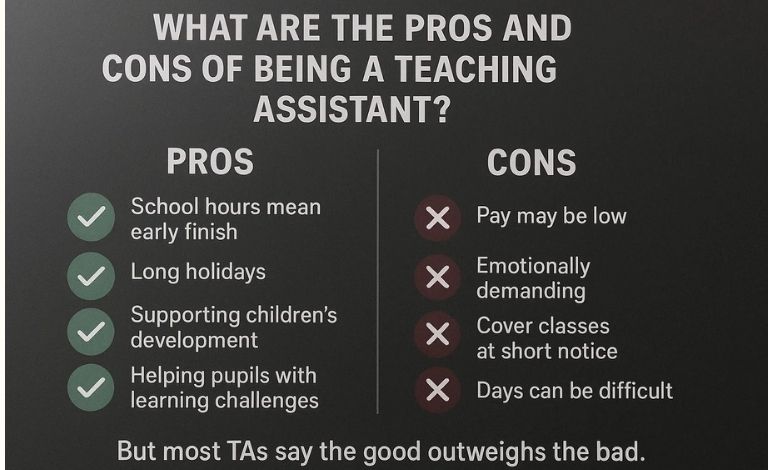If you’ve ever walked into a classroom and seen a calm, friendly adult quietly helping children focus or explaining something one-to-one, that’s a teaching assistant (TA). They’re the people who make schools run smoothly. Teachers plan and lead lessons, but TAs are the ones who make sure every pupil gets the help they need to actually learn. But is being a teaching assistant worth it UK?
The short answer is yes — if you care about making a difference, love being around children, and want work that fits around family life. The longer answer depends on what you value most.
Let’s talk honestly about what being a TA is really like, what you earn, what you get back emotionally, and how far the role can take you.
What Does a Teaching Assistant Do in the UK?
A TA’s day is busy and full of variety. You’ll support the class teacher in all sorts of ways — from helping pupils with their work to setting up the classroom before lessons start. Here’s what most TAs do every day:
- Help pupils understand and complete their work during lessons.
- Work one-to-one with children who need extra support — maybe they have SEND (special educational needs), EAL (English as an additional language), or behaviour needs.
- Prepare classroom resources, displays and activities.
- Supervise pupils at playtime, lunchtime, or on school trips.
- Support pupils emotionally — sometimes a quiet chat or calm voice is all it takes to help a child reset.
- Feed back to the class teacher or SENCO (Special Educational Needs Coordinator) about pupil progress, concerns or good moments.
The work might sound simple, but it’s not easy. It takes patience, empathy, and energy. TAs are often the first to notice when a child is struggling, and the first to celebrate when something finally “clicks.”
Why Do People Choose to Become Teaching Assistants?
Everyone has their own reason for choosing the TA path. Some people always wanted to work in schools but never felt drawn to being a full teacher. Others want to balance work with family life. And many just love helping children grow in confidence. Here are some of the most common reasons people become TAs:
- Love working with children but don’t want the extra planning, marking, and pressure that comes with being a teacher.
- Like school hours, which fit perfectly around family routines — usually 8:30 am to 3:30 pm.
- Want experience before teacher training. Many trainee teachers start out as TAs to learn how classrooms really work.
- Find joy in helping one child at a time, especially when they can see progress.
- Want a job that feels meaningful rather than just another 9–5.
If you ask most TAs why they do it, they’ll say, “I do it for the kids.” It’s not about the money — it’s about the impact.
Is Being a Teaching Assistant Worth It UK?
This question comes up all the time. The truth is, being a TA is worth it if you care about people more than pay. You’ll probably never get rich doing it, but you’ll gain something more important — purpose. TAs often say their job is rewarding because they help children who might not thrive without extra support. They make learning accessible, they build trust, and they see small victories every day.
Of course, it’s not always easy. Sometimes you’ll work with pupils who have big emotions or behaviour challenges. Sometimes you’ll feel overworked or underpaid. But when you see a pupil finally read their first full sentence or join in a group for the first time — it feels incredible.
So yes, it’s worth it, especially in schools that have supportive leaders, clear expectations, and a good team spirit.
How Much Do Teaching Assistants Earn in the UK?
Let’s talk about pay honestly.
Most TAs in the UK earn between £20,000 and £24,000 a year for full-time work. That’s the average full-time salary according to Jobted and other 2025 UK salary guides. However, here’s what you need to know: most TA jobs are term-time only. That means you get all the school holidays off — which is great — but your pay is usually spread across 12 months, so your monthly amount can look lower.
Many schools also pay by the hour, around £12 to £13.50 per hour depending on your area. Higher Level Teaching Assistants (HLTAs) or TAs with specialist skills (like working with autism or complex SEND) can earn £25,000 or more. And yes, London and high-cost areas pay a bit higher, often adding £2,000–£3,000 to your annual salary. Here’s the big picture:
- Entry-level TAs: around £18,000–£20,000
- Experienced TAs: around £22,000–£25,000
- HLTAs/Specialists: £25,000–£27,000+
So while the pay isn’t sky-high, the hours, holidays, and emotional rewards make up for it for many people.
What Are the Pros and Cons of Being a Teaching Assistant?

Like any job, being a TA has its highs and lows. Let’s start with the pros:
- The school hours mean you’re home by mid-afternoon.
- You get long holidays, which are perfect for parents.
- You’re part of a team that supports children’s growth and learning.
- You make a real difference for pupils with SEND or learning challenges.
- You can gain experience for a future teaching or education career.
Now, the honest cons:
- The pay doesn’t always match the level of responsibility.
- The work can be emotionally draining — especially if you deal with challenging behaviour daily.
- You might be asked to cover classes at short notice without extra pay.
- Some days are just plain hard — because kids are kids.
But most TAs say the good outweighs the bad. You go home tired, yes, but proud.
What Skills Do You Gain as a Teaching Assistant?
This is where the job shines. Being a TA teaches you so many transferable skills that you can use in any role later on. Here are just a few:
- Classroom management: You learn how to handle tricky situations calmly.
- Communication: You get used to talking to children, parents, teachers, and support staff every day.
- SEND knowledge: You understand autism, ADHD, speech and language needs, and emotional difficulties.
- Behaviour strategies: You pick up real techniques for de-escalating tension and keeping lessons flowing.
- Organisation and planning: You help prepare lessons, activities, and resources efficiently.
These skills are valuable not only in education but also in youth work, care, and training roles. Many TAs even go on to start their own tutoring or childcare businesses later.
Can Teaching Assistants Progress to Other Roles?
Yes, absolutely — and this is one of the best parts about becoming a TA. Once you have experience, you can move up into roles like:
- Higher Level Teaching Assistant (HLTA): You can lead small groups or even teach lessons.
- Pastoral or behaviour support: Focus more on wellbeing and emotional needs.
- SEN support roles: Work directly with children who have complex needs.
- Attendance or safeguarding support: Help families and schools work together.
- Office or admin roles: Move into the organisational side of school life.
And of course, many TAs go on to train as qualified teachers. The experience you gain as a TA makes your teacher training application much stronger. You already know how classrooms run, how pupils behave, and how to manage behaviour — skills new trainees often have to learn from scratch.
The key is training. The more qualifications you have, the more doors open. A CPD-accredited Teaching Assistant Course helps you build that foundation — giving you recognised skills that can help you climb the ladder later.
Is There Job Security for Teaching Assistants in the UK?
For the most part, yes. Schools always need TAs — especially with the growing focus on inclusion and SEND support.
However, job security can depend on school budgets. When funding gets tight, TA hours are sometimes reduced before teacher positions. That’s why it’s smart to keep developing your skills. TAs with training in SEND, medical care, or communication support are far more secure. Schools rely heavily on people who can handle complex needs safely and confidently.
So, the more specialist knowledge you have, the safer your job becomes.
What Do Teaching Assistants Say About Their Job Satisfaction?
If you ask TAs how they feel about their jobs, most will smile — even when they’re tired. They say things like:
- “It’s the most rewarding job I’ve ever had.”
- “No two days are the same.”
- “The pay could be better, but the kids make it worth it.”
TAs feel happiest when:
- They see their pupils make progress.
- Their teachers treat them as part of the team.
- They get time for proper breaks and planning.
- Leadership listens and values their input.
The frustration usually comes when TAs take on too much responsibility without recognition — for example, running lessons or managing behaviour without HLTA pay. But in schools with supportive leaders and clear roles, job satisfaction stays high.
Is a Teaching Assistant Career a Good Fit for You?
If you’re patient, caring, and calm under pressure, you’ll love it. If you enjoy structure, routine, and being part of a community, it will suit you perfectly.
You’ll need to enjoy helping others and be okay with days that don’t always go to plan. You’ll laugh a lot, you’ll repeat instructions endlessly, and you’ll deal with everything from missing pencils to playground tears — but you’ll make a difference every single day.
Being a TA is not about perfection — it’s about consistency. Children remember the adults who believed in them, and that’s what this role is all about.
Can You Train to Become a Teaching Assistant?
Yes — and you don’t need a university degree to get started. The best way is through a CPD-accredited Teaching Assistant course. This kind of course teaches you everything you need to work safely and confidently in a classroom, including:
- Understanding your TA role
- Supporting SEND pupils
- Safeguarding and child protection
- Communication with teachers and parents
- Managing behaviour in positive ways
Once you complete your CPD-accredited course, you’ll have a certificate recognised across UK schools. It’s a great first step if you’re switching careers, going back to work, or just starting out in education.
At the Unified Course, our Teaching Assistant Course is designed to be flexible, and practical. Learn online at your own pace and get the qualification you need to start applying for TA jobs right away.
Is There Room to Grow Financially as a TA?
Definitely. While the starting pay might feel modest, there’s plenty of room to move up. Here’s how TAs increase their income over time:
- Gain experience: The longer you stay, the more you earn.
- Get qualified: Completing a Level 3 or CPD-accredited course can boost your pay.
- Specialise: Focus on SEND, behaviour, or literacy support — these roles pay more.
- Become an HLTA: This comes with higher pay and responsibility.
- Move into teaching: With the right degree and training, you can become a qualified teacher.
Brick by brick, you can build your career in education, starting with that first TA role.
What Are the Best Things About Being a TA?
Let’s end on the positives, because there are many.
- You see children grow in confidence right in front of your eyes.
- Work in a warm, social environment where no two days are the same.
- Have real impact — sometimes more than you realise.
- Enjoy school holidays and a healthy work-life balance.
- Build skills that can take you into many areas of education.
Most TAs say that even on tough days, they wouldn’t swap their job for anything else. There’s a sense of belonging and purpose that’s hard to find elsewhere.
Final Thoughts: Is Being a Teaching Assistant Worth It in the UK?
So, is it worth it?
Yes — if you want a job that matters.
Being a teaching assistant isn’t about getting rich. It’s about helping children succeed, supporting teachers, and feeling proud of what you do. It suits people who value meaning, school hours, and community more than money. If you see the role as a stepping stone — maybe towards HLTA status, SEND work, or teacher training — then it’s even more worth it. Every skill you learn as a TA is useful somewhere else later.
And remember, your experience is worth more when it’s backed up with training. A CPD-accredited Teaching Assistant Course gives you confidence, credibility, and real career options.
The classroom will always need caring, patient people — people who notice the quiet child, encourage the shy one, and keep the busy ones on track. If that sounds like you, then yes — being a teaching assistant is more than worth it.
FAQs
1. Is being a teaching assistant worth it in the UK?
- Yes, it’s rewarding for experience and helping students, though pay is modest and workload demanding.
2. Is being a teaching assistant worth it?
- Yes, for gaining educational experience, skill development, and satisfaction in supporting learners, despite limited pay and advancement.
3. What are the disadvantages of being a teaching assistant?
- Low pay, limited career progression, high workload, and emotional demands are key disadvantages.
4. What is the disadvantage of TA?
- Mainly low salary and feeling undervalued despite significant classroom responsibility.
5. Why is being a teaching assistant so hard?
- Workload, managing diverse needs, and limited recognition make it challenging.
6. What not to do as a TA?
- Don’t overstep teacher authority, share confidential information, or neglect professional boundaries.
7. Why are schools getting rid of TAs?
- Budget cuts and restructuring often reduce TA roles to save costs.
8. What is the 70 30 rule in teaching?
- Teachers lead 30% of the time; students engage independently for 70%.
9. Is becoming a TA hard?
- No, but it requires patience, dedication, and good communication skills.



